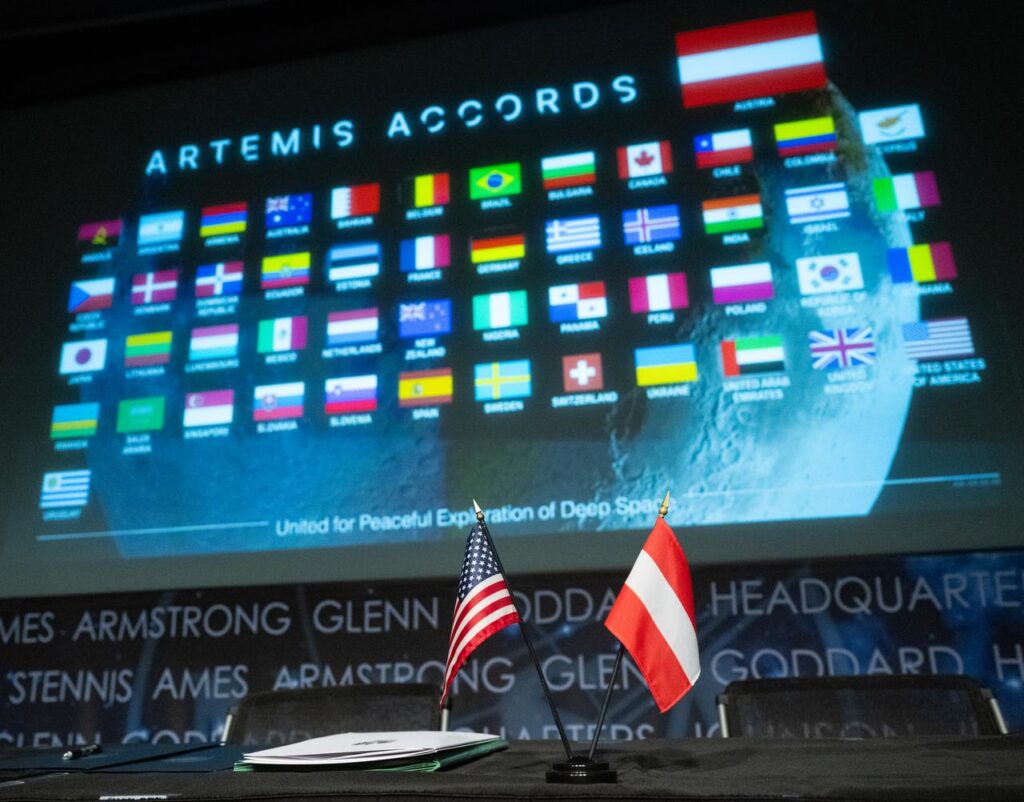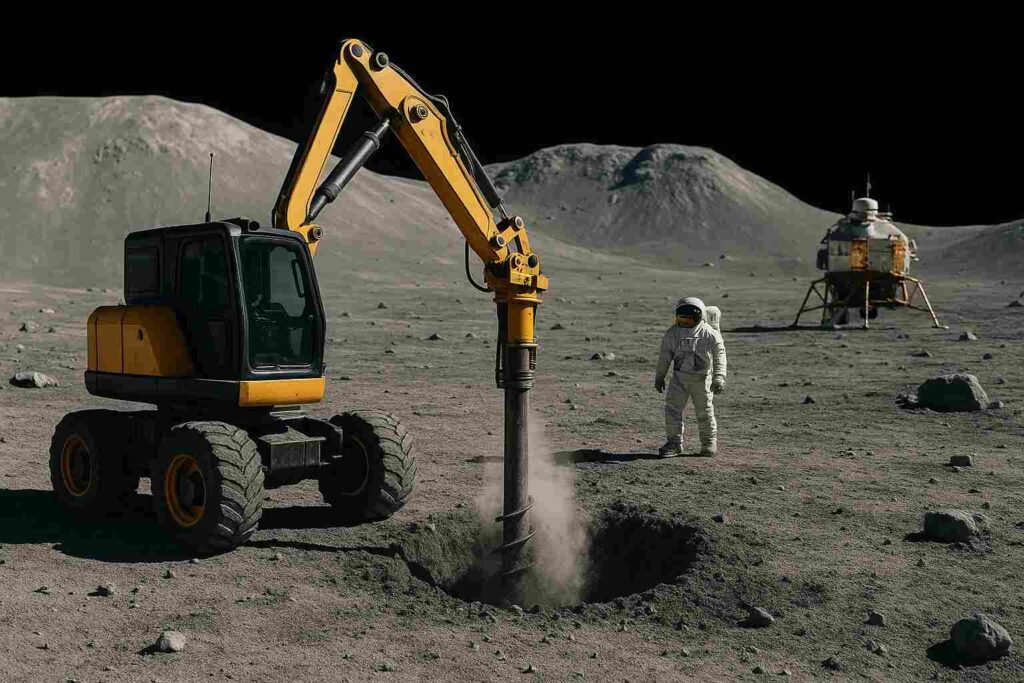The Moon Agreement, officially known as the Agreement Governing the Activities of States on the Moon and Other Celestial Bodies, was adopted by the United Nations General Assembly in 1979 and came into force in 1984. It was designed to establish a legal framework for activities on the Moon and other celestial bodies, building upon the Outer Space Treaty of 1967.
The agreement outlines the principles of peaceful exploration, non-appropriation, and responsible management of outer space resources, particularly regarding the Moon’s natural resources. Despite its ambitious goals, the Moon Agreement has seen limited ratification, with only 17 states formally adopting it, none of which are major spacefaring nations. This lack of participation has led to its reduced relevance in the modern space age.
In contrast, newer legal instruments, such as the Artemis Accords, have gained traction among leading space nations, signaling a shift in space governance.
Key Provisions of the Moon Agreement

The Moon Agreement outlines several key provisions that govern activities on the Moon and other celestial bodies. These provisions aim to promote peaceful exploration, prevent national appropriation, and establish guidelines for resource utilization.
Here’s a summary of its most significant points.
1. The Moon as the Common Heritage of Mankind
One of the most significant and debated provisions of the agreement is the classification of the Moon and its natural resources as the “common heritage of mankind.” This principle ensures that the Moon remains a resource for all humanity, preventing any single nation or entity from claiming ownership.
This principle has been at the center of debates regarding future lunar resource utilization. It establishes that:
- No nation can claim sovereignty over the Moon.
- Resources extracted from the Moon must be governed by an international regime.
- Benefits derived from lunar exploration and exploitation must be shared equitably among all nations.
2. Prohibition of National Appropriation
The agreement reinforces the Outer Space Treaty’s principle that no state can claim ownership of the Moon or any celestial body. This provision is crucial in preventing unilateral exploitation of space resources.
It specifically prohibits:
- Claim of sovereignty through occupation or usage.
- National appropriation by private entities, corporations, or governments.
- Militarization, ensuring only peaceful exploration and activities.
3. Peaceful Use and Demilitarization
To maintain the Moon as a zone of peace, the treaty explicitly forbids any military activity beyond peaceful scientific research.
The key restrictions include:
- The use of the Moon for hostile acts or threats against Earth or space objects.
- The deployment of nuclear weapons or other weapons of mass destruction on the Moon.
- The establishment of military bases, fortifications, or military maneuvers.
However, military personnel are permitted on the Moon only for peaceful purposes, such as scientific research and assistance in space missions.
4. International Responsibility and Transparency
The agreement mandates that all space activities conducted on the Moon must adhere to international transparency and accountability standards. This ensures that lunar exploration remains open and cooperative.
Key transparency requirements include:
- Reporting to the United Nations Office for Outer Space Affairs (UNOOSA).
- Transparency regarding mission objectives, locations, and duration.
- Conducting activities with maximum precautions to avoid harmful contamination.
- Engaging in consultations without delay in case of disputes or conflicting operations.
5. Resource Exploitation and the Future of Lunar Mining
One of the most controversial aspects of the Moon Agreement is its stance on space resource extraction. Article 11 calls for an international regulatory framework to oversee the extraction and utilization of lunar resources before commercial exploitation becomes feasible.
- The agreement does not prohibit mining but restricts appropriation by claim.
- It proposes a future international regime to ensure equitable resource distribution.
- Unlike national laws such as the U.S. Commercial Space Launch Competitiveness Act (2015), the Moon Agreement emphasizes collective rather than individual resource rights.
Why Leading Space Nations Have Not Signed
Despite its noble intentions, the Moon Agreement has been largely ignored by leading space nations such as the United States, Russia, China, and members of the European Space Agency (ESA). The reasons for this lack of participation include concerns over sovereignty, commercial interests, and legal frameworks.
1. Concerns Over Resource Exploitation
Many major spacefaring nations prefer national control over space resources rather than adhering to an international regime. Countries that have taken independent legal steps include:
- The United States, Luxembourg, Japan, and the UAE, which have enacted laws recognizing private ownership of space resources.
- The common heritage principle of the Moon Agreement is viewed as a barrier to commercial space development.
2. The Shift Toward the Artemis Accords

With growing commercial and governmental interest in lunar exploration, a new framework was needed. The Artemis Accords, led by NASA, offer an alternative approach:
- Over 45 nations have signed the Artemis Accords, marking a shift away from the Moon Agreement.
- The accords allow for space resource extraction while ensuring transparency and peaceful cooperation.
- Unlike the Moon Agreement, they are designed to facilitate commercial activities on the Moon.
3. Lack of Enforcement Mechanisms
Another significant limitation of the Moon Agreement is its lack of binding enforcement. Without a governing body, nations have been reluctant to adhere to its provisions, because:
- No international authority exists to regulate compliance.
- Nations are reluctant to cede control to an undefined international organization.
4. Legal and Geopolitical Shifts
The legal landscape of space exploration is evolving, and many spacefaring nations are shifting away from UN-based governance:
- The United States Executive Order 13914 (2020) explicitly rejected the Moon Agreement.
- Space-faring nations are increasingly moving toward bilateral and multilateral agreements rather than UN-based treaties.
- Private companies are actively developing technologies for lunar mining, and the agreement’s restrictions are seen as outdated and impractical.
The Future of Lunar Exploration and Mining

The Moon’s rich resources, including helium-3, water ice, rare metals, and possibly even rare earth materials, make it a prime target for future space mining and sustainable development. Helium-3 could revolutionize fusion energy, while water ice can be converted into certain types of fuel for deep-space missions.
Nations and private companies are advancing resource extraction technologies, but without global regulations, fragmented policies, and legal uncertainty, they create potential conflicts over ownership and commercial rights. With only 17 states ratifying it, the Moon Agreement lacks support from major spacefaring nations, limiting its impact. Saudi Arabia’s 2024 withdrawal further signaled its decline, reinforcing its irrelevance in modern space law. As national policies and agreements like the Artemis Accords gain traction, the treaty’s influence continues to fade.
One thing is sure: a stronger legal framework is needed to balance national interests with global cooperation in lunar mining. While the Artemis Accords promote transparency and resource-sharing, a broader consensus is essential to prevent disputes and ensure sustainable space exploration. Without clear regulations, conflicts over lunar resources could slow progress in space development.
Why Legal Clarity on Lunar Resources Is Urgent
The short answer is that Lunar exploration is moving fast, and without clear rules, things could get messy fast. Different countries and companies have their own ideas about who can mine the Moon, which could lead to conflicts and confusion. Without a fair and agreed-upon system, it will be harder to invest in and develop space resources in a way that benefits everyone. A robust legal framework is now essential to ensure that lunar resources are used responsibly, fairly, and without dispute.